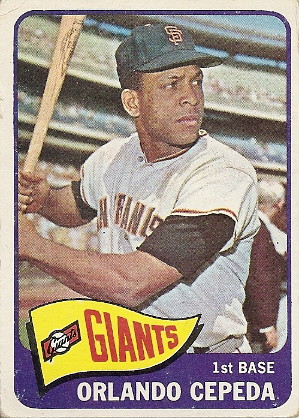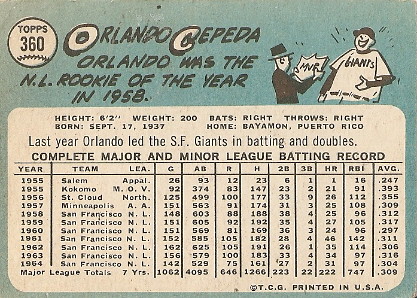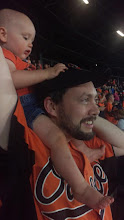
Orlando Cepeda was a second-generation baseball player; his father Pedro was a great hero in their native Puerto Rico and was known as "the Bull", hence the nickname "Baby Bull" for the younger Cepeda. Orlando signed with the Giants as a teenager, and announced himself as a 20-year-old in 1958. His .312 average, 38 doubles (tops in the NL), 25 home runs, and 96 RBI (tied with Willie Mays for team-best) made him the unanimous choice for National League Rookie of the Year. He avoided the sophomore slump, improving in most offensive categories (.317-27-105) and making the first of six straight All-Star teams. Cepeda was a monster in 1961, batting .311 with a league-leading 46 homers and 142 RBI. He placed second to Frank Robinson (.323-37-104 for the pennant-winning Reds) in the NL MVP vote.
Undaunted by his near-miss for league honors, Orlando kept on rolling in 1962 (.306-35-114), this time teaming with Willie Mays to lead the Giants to their first World Series since 1954. Unfortunately, the Baby Bull was just 3-for-19 as the Yankees outlasted San Francisco in seven games. After performing at his usual high level in 1963 and 1964, the powerful first baseman had a disastrous 1965. A knee injury limited him to 33 games, and brought to an end an incredible stretch in which he placed in the NL's top ten in home runs and RBI for each of his first seven years (he had also been a top ten hitter for average in each of his first six years - his .304 in 1964 missed out by .002). Annoyed by his slow recovery, the Giants traded Cepeda to the Cardinals for pitcher Ray Sadecki early the following year; it was a move they would soon regret.
After a merely decent (by his standards) first season in St. Louis, Orlando owned the NL in 1967: .325 average and .399 on-base percentage (both career-highs), 37 doubles, 25 home runs, 111 RBI (NL-best). It's important to remember that this was a season dominated by pitching; over in the AL, only four batters reached .300. Cepeda was the runaway choice for NL MVP, collecting all 20 first-place votes and more than doubling the point total of teammate and runner-up Tim McCarver (yep...Tim McCarver). The Redbirds won 101 games and outlasted the "Impossible Dream" Red Sox in a seven-game World Series. Orlando again struggled badly in the postseason, hitting just .103 (3-for-29) with a single RBI, but this time his teammates picked him up. Those October hitting woes carried over to the following season, however. He hit a career-low .248 with 16 home runs and 73 RBI, which was still above league average in what came to be known as the Year of the Pitcher. St. Louis repeated as NL champs, but dropped the World Series to the Tigers in seven. Cepeda finally got untracked a bit, hitting .250 with a pair of homers in the Fall Classic. The following March brought an end to his time in red and white, though; the Cards pulled a classic challenge trade, sending their slugger to Atlanta for catcher/first baseman Joe Torre.
Cepeda's first go-round with the Braves brought incremental improvements, as he contributed to the first-ever NL West champions. Despite his 5-for-11, 3-RBI effort in the playoffs, the Mets swept Atlanta in three games. But 1970 was another year to remember, individually. The 32-year-old slugged 33 doubles and 34 homers, again driving in 111 while batting .305. He again couldn't keep his momentum, playing only partial seasons in 1971 and 1972, including a three-game run with Oakland in July of the latter year.
Used strictly as a designated hitter, Orlando had a last hurrah with the second-place Red Sox in 1973. His .289-20-86 line got him some nominal MVP consideration, but Boston released him the following spring. After an inglorious 33-game cameo in Kansas City, Cepeda was released at season's end and retired with a .297 average, 379 home runs, and 1,365 RBI.
A 1975 arrest and 1978 conviction on drug possession charges (he had imported cannabis from Colombia) led to a five-year prison sentence. Cepeda spent ten months in jail, and served the duration of the sentence on probation. This incident may have caused the Baseball Writers' Association of America to turn a blind eye to his considerable achievements on the field, as his Hall of Fame eligibility came and went. In 1999, the Veterans' Committee finally chose Orlando as the second Puerto Rican to be enshrined in the Hall (following Roberto Clemente).
Fun fact: Orlando hit three home runs in his first three at-bats on July 26, 1970, all coming off of unfortunate Cubs starter Bill Hands. The third was a fifth-inning grand slam that gave the Braves a 7-2 lead. The Baby Bull added a ninth-inning RBI single, bringing his RBI total to seven in an 8-3 win for Atlanta.



I've said this before, but as a Dodger fan, I'm quite certain that Cepeda would be the guy I liked least on the Giants if I was around to root against them back then. Without looking at the record books, he just seems like he killed the Dodgers.
ReplyDeleteCha Cha! Another Brave in the Hall of Fame. Those dirty Mets robbed us in '69!
ReplyDeleteNight Owl - I know what you mean. For some strange reason, one of the first Oriole killers I think of is Frank Catalanotto. That little smurf has destroyed us over the years.
ReplyDeleteDayf - One of the few 1971 Topps in my collection is a lovely Cha Cha Braves card. It's beaten to hell, but when I saw it in a dollar box at a hobby shop, I jumped at it.